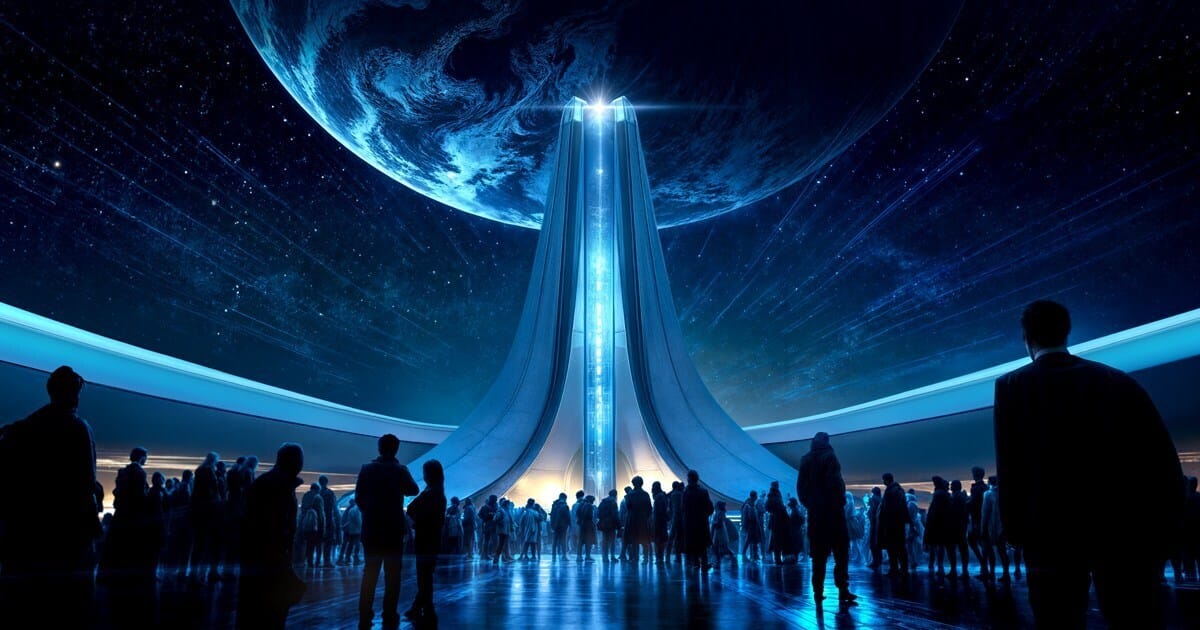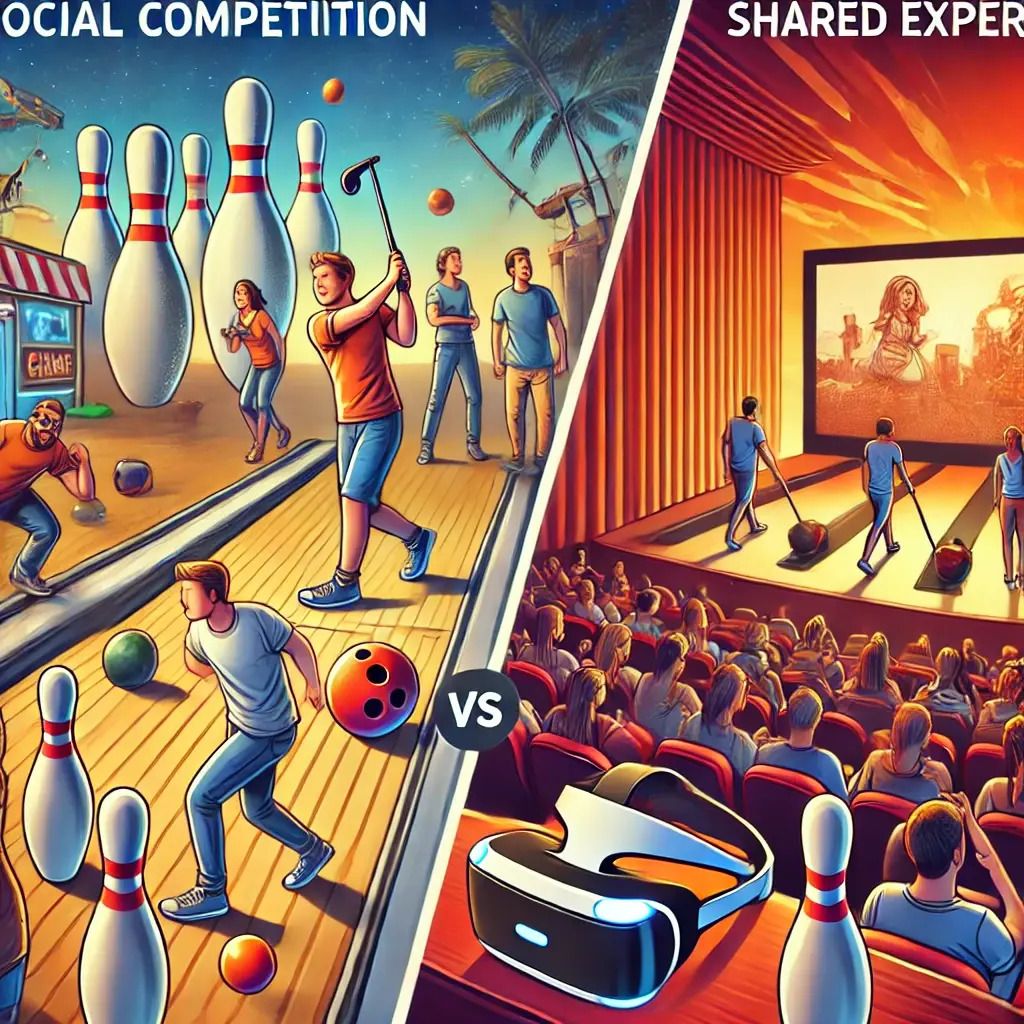
There’s way too much hype about social experiences in the location-based entertainment market. I was talking to a supplier this week who said he toured FECs in the US asking operators what they wanted from a new attraction. Overwhelmingly they said it needs to be social and competitive. That’s an oversimplification, which I discuss below in One Big Thing. But first the all the news about new VR installations around the globe…
"You win some, you lose some. At least we are all together...
New Developments

Virtual Reality Field Trips to the ISS? Yes please!
FECs and Arcades
Curiosity in Orbit: How VRCore Is Changing the Way We Learn About Space
VRCore is transforming how we explore space with its innovative VR experiences, offering an engaging and interactive way to learn about the cosmos. Read more
Museums and Science Centers
Lenovo and Shanghai Natural History Museum: Resurrecting Earth’s Majestic Creatures with VR and AI
Lenovo teams up with the Shanghai Natural History Museum to use VR and AI to bring extinct creatures back to life, offering visitors an awe-inspiring journey into Earth’s past. Read more
Art, Music, and Culture
How VR Goggles Bring the Sanxingdui Ruins to Life
Discover how VR goggles are recreating the wonders of the Sanxingdui Ruins, immersing visitors in the fascinating world of this ancient civilization. Read more
Cosm to Open 4th Immersive Theater Location in Downtown Detroit: What You Need to Know
Cosm is bringing its state-of-the-art immersive theater to downtown Detroit, offering captivating 360-degree experiences for art and culture enthusiasts. Read more
Travel and Tourism

Area 15 adding 20K square foot free roam VR space attraction.
Felix & Paul Announce 20,000-Square-Foot Interstellar Arc for Epic Deep Space Adventures at Area 15
Felix & Paul Studios unveil their Interstellar Arc, a massive VR attraction that takes visitors on an epic journey through deep space exploration. Read more
Bristol Christmas Market Offers Unique VR Sleigh Ride Experience
This holiday season, Bristol’s Christmas Market is offering a magical VR sleigh ride, letting visitors glide through a festive virtual wonderland. Read more
One Big Thing

On Competition, Socialization, and Shared Experiences
The big buzzword now in the industry seems to be “competitive socialization.” And like Location-based Entertainment, I regret that it’s taken hold. Socialization is not competitive. That’s just dumb.
What I think they (whoever they are) were trying to capture is that people want to go out and socialize, and many of the things people choose to do while socializing these days look competitive. So let’s just mash two words together without actually thinking about the meaning of the phrase, and then call it a market. Voila! The “competitive socialization” market is born. So for accuracy sake, let’s call it social competition.
Bowling, darts, mini-golf, shuffleboard, axe-throwing, Top Golf…all of these activities fit the new market definition. Forget that they’ve been around for decades, this
“new” trend is all the rage. New concepts are popping up all the time. Now there’s basketball, soccer, and even cricket social venues.

I recently saw an article that included pickleball in the competitive socialization trend. Which got me to thinking, where is the line between social competition and more serious competition? Certainly pickleball is more of a sport. I was in a softball - beer league once. Sure it was social, as we would get together afterward and drink beer, and sit in the dugout every half inning and shoot the shit while hoping for a turn at bat. But are we to lump everything we do into this competitive socialization bucket?
There are two hallmarks of the social competition:
Turn-based play - one person plays while the others watch. Each turn takes about a minute, so the player is never out of the conversation long enough to lose the thread. This allows most of the group to focus on socializing, and less on playing.
Flat learning curve - everybody can play and have fun, and one person with a high skill level doesn’t ruin it for the others. If I roll a 300 bowling, it doesn’t ruin the fun you had rolling your 120. But if we are playing pickleball, and you never get the chance to return the ball, that ain’t fun.
If everyone is playing at the same time, they’re too focused on the game to be social. This is not a social experience. But not all experiences need to be social to be successful. Shared experiences can be meaningful too.
I went to my first Cinemacon about a decade ago. If you have not been, put it on your bucket list, especially if you’re a movie fan. It’s a blast and well worth the $1500 ticket price. Each studio hosts a multi-hour preview of the films coming out in the next year. The directors and stars often come on stage after each clip or trailer and discuss the movie. It’s a love fest between the studios and theater owners who make up most of the audience. One of the things that stood out for me was how each studio exec, director, and star kept talking about the power of the shared theatrical experience.
When you go to a movie, silence is mandated (unless your seeing Wicked and then singing is apparently OK, or not.) Movies are not social experiences, even though we go with friends and family and see the moview with hundreds of others. Long before social competition was a thing, shared experiences were what people wanted.
Randy White wrote about the power of crowds in his newsletter last month. He references what’s called social embeddedness, or participating in activities that fill a desire to belong to a larger, societal-level collective. Things like movies and sporting events, and even being in a busy entertainment center, fit the bill.
A Personal Note from Bob:
I’ve been working on the bleeding edge of technology in LBE for 35 years. During that time I got married, had kids, took a company public, went through bankruptcy, gotten divorced, and came through the other end of a mid-life crisis. And through all of that, the most important lesson I have learned is that communication is the key to a great relationship.
Over the last 8-years, my partner Kylie and I have been using a communication tool we developed together to manage our lives. We work and travel together 100% of the time, which can be challenging in the best of times. We believe this tool has not only made our communication better, but it’s deepened our connection with each other.
We’ve shared it with several other couples, and they’ve reported back that it’s been a game-changer for their relationships. So we’ve decided to share it with you. We call it The FrameUp.
As our Christmas gift to you, we are hosting a free online workshop to share the FrameUp to make your holidays less stressful, avoid misunderstandings, stay aligned and have a truly joyful holiday season with your partner. With the holidays fast approaching, we thought it would be useful for anyone who finds holiday gatherings stressful.
It’s on Sunday, December 15th, at 4:30 PM Pacific, 7:30 PM Eastern Time. I hope you can join us. Register at this link.
Not Everyone is a Competitor
Research suggests that competition is a genetic trait, and that men tend to be more competitive than women. Building a business that over-emphasizes competition and ignore collaborative play risks missing a substantial part of the market.
Escape rooms are a great example of a co-op shared experience. The players are busy solving the puzzle, and the communication is focused on the task at hand. That’s not being social. But it’s a shared experience where the team comes together to solve the puzzle. At the end, beating an escape room together can be way more memorable than winning a round of mini-golf.
In VR arcade games, most of the popular ones are co-operative play, where the group is teaming up against the environment. Whether it’s shooting zombies with shotguns, orcs with a cross bow, of aliens with a plasma rifle, everyone is in it together. Sure there are high scores and achievements, but the overall goal is to win together. Player vs player (PvP) games, like laser tag, are much less popular. Tim Ruse, co-founder and CEO of Zero Latency, in 2016 told me, when someone pays $50, they don’t want to lose. I didn’t appreciate the wisdom of those words back then. These experiences aren’t social, but they are shared.
Sandbox VR has a unique mechanism in their Deadwood series of zombie survival games. When a member of the squad “dies” another member needs to place their hand of the shoulder of the dead teammate to revive them. That physical touch is another way of creating connection in a VR experience. It’s actually quite powerful.
Kylie, my partner, hates playing PvP games with me, because she always loses. I spent almost a decade playing laser tag, so I developed some skill in that area. She feels like every time she spawns, someone shoots her. It’s just not fun. But she does enjoy the co-op games, because it requires teamwork, communication, and in the end, everyone wins, (even if she doesn’t get the high score.)

Mirra Immersive in Seattle is the first Social Competition VR venue.
Mirra in Seattle created a social competition venue based on VR games in Seattle. Teams of people send a different player into the arena for each mini game, to compete against the other teams. It’s a novel take on the genre and technology, and I look forward to learning more about it when the founder, Sam Wang joins us at the VR Arcade and Attractions Summit in March.
When considering attractions, jumping on the bandwagon can seem less risky. But at some point (we might be there already) all these “competitive socialization” venues are going to start looking that same. And if they’re all competing with each other for a slice of the market that is attracted to competitive experiences, we might see a bubble burst sooner than later.
Offering a mix of co-op and competitive, shared and social experiences will appeal to the broadest market. Whether you do that with virtual reality technology or not, a balanced approach might be a better business strategy.
Stay Immersed,
Bob
Other Tidbits
One of the biggest issues with HTC VIVE Focus 3 is the frequently broken overhead strap clip on the back. Dave Myers from HTC pointed me to this solution from the Creative Prop Shop.
Fireloop Services announced a new partnership to support Sandbox VR locations. They previously had announced becoming an authorized service center for bHaptics.
Abacus Brands is actively seeking partners in the augmented reality and virtual reality toy space, with a focus on educational layers that can deliver fundamental values. They’re interested in content that is not only creative, but inspiring and engaging, from arcade style gaming and interactive arts, to board games and family play. Apply here
Striker VR announced a consumer version of the Mavrik Pro haptic rifle for the Quest.
Did someone wonderful send this newsletter to you?
Subscribe here - and give them a hug from us! 🤗
Want to Drive More Sales?
This newsletter is received by almost 9,000 people every week.
Reach the most interested and engaged VR operators.
Get More Information





